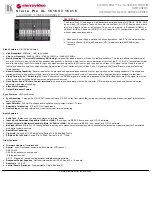
420
-----END CERTIFICATE-----
# Export the local certificates and their private keys in the PKI domain to a file named
cert-lo.der
in
PKCS12 format. The password for the private keys is 123.
<Sysname> system-view
[Sysname] pki export domain domain1 p12 local passphrase 123 filename cert-lo.der
# Export all certificates in the PKI domain to a file named
cert-all.p7b
in PKCS12 format.
<Sysname> system-view
[Sysname] pki export domain domain1 p12 all passphrase 123 filename cert-all.p7b
Related commands
pki domain
pki import
Use
pki import
to import the CA certificate, local certificates, or peer certificates for a PKI domain.
Syntax
pki import domain domain-name
{
der
{
ca
|
local
|
peer
}
filename filename
|
p12 local filename
filename
|
pem
{
ca
|
local
|
peer
} [
filename filename
] }
Views
System view
Predefined user roles
network-admin
mdc-admin
Parameters
domain-name
: Specifies a PKI domain by its name, a case-insensitive string of 1 to 31 characters.
The domain name cannot contain the special characters listed in
Table 54 Special characters
Character name
Symbol
Character name
Symbol
Tilde
~
Dot
.
Asterisk
*
Left angle bracket
<
Backslash
\
Right angle bracket
>
Vertical bar
|
Quotation marks
"
Colon
:
Apostrophe
'
der
: Specifies the DER certificate file format, including PKCS#7.
p12
: Specifies the PKCS#12 certificate file format.
pem
: Specifies the PEM certificate file format.
ca
: Specifies the CA certificate.
local
: Specifies the local certificates.
peer
: Specifies the peer certificates.
filename filename
: Specifies a certificate file name, a case-insensitive string. For a certificate in
PEM format, you can also choose to copy and paste the certificate contents on the terminal instead
of importing from a file.
















































